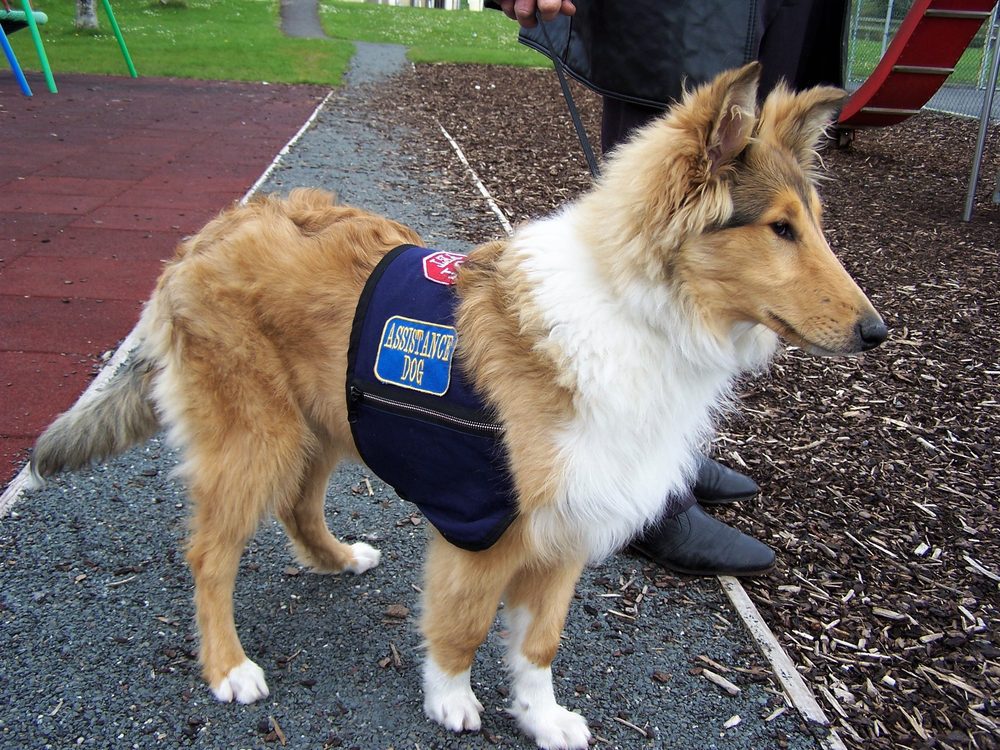South Dakota residents are protected by federal emotional support animal laws that allow those in need of an emotional support animal to travel and live with their companion without discrimination. The most noteworthy law is the Federal Fair Housing Act (FFHA).
Although emotional support animals are allowed to live with their owner regardless of pet policies by landlords, there are some restrictions that may apply. There are also certain areas where emotional support animals may not be allowed, such as some places of employment and public accommodations like certain stores, schools, and hotels.
It is helpful to understand the rights you and your emotional support animal have under South Dakota and federal law to ensure you are not unjustly discriminated against and denied opportunities. The following is a complete overview of the emotional support animal laws in South Dakota for housing, travel, employment and public accommodations. We also layout the process of obtaining an ESA letter.
Owners of an emotional support animal are protected under the Federal Fair Housing Act from discrimination and denial of housing opportunities due to their disability or the presence of their pet. The law states that landlords cannot deny a person or their emotional support animal access to housing if they are able to provide a letter of recommendation from a licensed mental health professional for the emotional support animal.
Additionally, the tenant is exempt from any pet policies or pet fees the landlord has if their animal is an emotional support animal. The same applies for service animals as well. Although, the tenant will likely be responsible for any damage done by the pet, such as stains in the carpet or damage to the walls.
There are some exceptions that may apply that allow the landlord to deny the tenant or their emotional support animal living accommodations. If the animal requires extensive alterations to the living area, such as a miniature horse that would require a larger and more tailored area of space, then the ESA letter may not be accepted. Additionally, animals that show aggressive, destructive or consistently disruptive behavior may also be denied by the landlord as well.
However, most dogs, cats or other pets that are quiet, calm and well behaved are permitted and protected under the Federal Fair Housing Act. The landlord may ask for documentation to show the need for the emotional support animal—although all that is legally required is an ESA letter. The tenant is not required to provide specific details beyond what is contained within the letter. For service animals, the landlord may only ask about the disability if it is not obvious (for example, a dog that leads someone who is visually impaired).
Employment Laws
The American with Disabilities Act (ADA) protects individuals who rely upon a service animal to deal with their disability in the workplace. Employers are required by law in South Dakota to make the necessary arrangements to allow an employee with a service dog to bring their companion to work—or make other reasonable accommodations that both parties agree to.
Unfortunately, however, the laws established in the ADA do not apply to individuals with emotional support animals. This means employers are not required to make any accommodations for emotional support animals in the workplace, and they can deny the employee the ability to bring the animal to work with them.
One of the main differences between service animals and emotional support animals is the amount of training. Service animals are typically trained to deal with work environments for long periods of the day, whereas emotional support animals may not handle these types of situations as well.
With that said, there are times when someone may struggle to make it through the day without their faithful emotional support animal. In these instances, it is best to have a discussion with the employer about bringing the ESA to work or arranging another way to make the workday less stressful. Many employers are understanding and willing to work out a way to make the work environment more pleasant, even without ADA regulations in place.
If the employer denies your emotional support animal, then first try and work out other accommodations, such as working in a remote role. In the worst-case scenario, it may be best to find a new employer that is more understanding and accommodating.
Public Accommodation Laws
Owners of public establishments are not required by South Dakota law to allow emotional support animals. They are, however, required to allow people with disabilities that have a service animal to bring their companion into the establishment without charging a fee or denying access.
With service animals, the public place also cannot ask the person about their disability or ask them to provide documentation if the disability is obvious, such as the inability to walk without the service animal by the person’s side. Since public accommodations are not required to allow emotional support animals, they can ask visitors to leave regardless of whether the person has an official ESA letter or not.
By understanding that South Dakota does not require public places to make accommodations for emotional support animals, you can properly prepare. If you do not need your emotional support animal by your side, then you can make arrangements to make them comfortable and content while you are gone. If you feel as if it will be difficult to get by without your buddy there beside you, then be sure to call the establishment you plan to attend in advance and let them know of your need. Many will be willing to allow the pet in as long as it is well-behaved and not disruptive in any way.
If the public place does allow you to bring your emotional support animal, be sure to bring your ESA letter along with you just in case. You may also be responsible for any damages the service animal or emotional support animal causes while there.
Travel Laws
The Air Carrier Access Act (ACAA) previously used to allow all ESAs in the cabin of a plane for free. However, the ACAA has since been updated and unfortunately ESAs are treated as regular pets on airplanes now. This means that airlines can charge a pet fee, and can make your ESA ride in the cargo if it’s too large or there are too many other pet reservations.
If planes trigger your anxiety (or other mental conditions) and you need support from your furry friend during takeoff and landing, it may be beneficial to see if registering your ESA as a psychiatric service animal is right for you. Service animals have more legal protections than ESAs, and you won’t have to worry about leaving your emotional support in cargo.
An Overview of an ESA Letter
An ESA Letter lets landlords, public places and employers know that your companion animal provides an important need for your emotional health. In areas where laws allow for emotional support animals to be with their owners—such as in housing facilities—the person with a disability or mental health complication is protected against discrimination and able to receive reasonable accommodations by showing the ESA letter.
In other scenarios where emotional support animals are not protected by the law, an ESA letter can still show the other party that you need or can strongly benefit from your emotional support animal being by your side. Some have attempted to abuse ESA laws, but the ESA letter lets others know that you have a genuine need for the support animal.
Service Animals in South Dakota
Service dogs are different than ESAs, but there are some similarities. Read on to learn more about these helpful animals.
Psychiatric Service Dog in South Dakota
Psychiatric service dogs can help with mental health disorders like anxiety, OCD, and bipolar disorder. Depending on the condition, service dogs pair well with medication therapy, counseling, and other treatments. For this reason, many people in South Dakota have service dogs for their mental health conditions.
What makes a service dog unique is its training. They’re well-trained dogs that have to perform a specific task. Tasks vary in complexity but can be simple things like opening a door or complex things like applying deep pressure therapy. Ultimately, the type of training your psychiatric service dog needs depends on your specific conditions.
In South Dakota, psychiatric service dogs are protected from discrimination by law. Laws that protect these dogs include the Fair Housing Act (FHA) and the Americans with Disabilities Act (ADA). It’s also important to note that South Dakota doesn’t discriminate based on breeds, so you can have most breeds as a service dog. This also applies in cities or counties that banned the breed.
PTSD Service Dog in South Dakota
PTSD service dogs are a specific type of psychiatric service dog that helps with post-traumatic stress disorder. PTSD service dogs help their owners in many ways, including recognizing someone’s emotions to prevent panic attacks, guiding people to safety, and helping people remain calm. Depending on the type of PTSD service dogs can also provide deep pressure therapy to help someone through a panic attack.
What makes a PTSD dog unique is their training. They’re trained for the specific condition and learn their owner’s emotions and triggers. PTSD service dogs can also help people remain calm just by being a calm presence. For people who have trouble being out in public places alone, a PTSD service dog is a great way to live independently again.
How to Get an ESA Letter in South Dakota
There are some key requirements for getting a legitimate ESA letter. Perhaps most importantly, you should choose an ESA letter provider that uses a thorough evaluation process that involves an interview with a licensed mental health professional (LMHP). Without the recommendation of the LMHP, an ESA letter is not legitimate.
Here at U.S. Service Animals, we offer ESA registration and provide those in need of an ESA with a legitimate ESA letter. Our process takes three steps, which involves filling out the registration form, an interview with a mental health professional and receiving the ESA letter we send to you upon completion of the process at the recommendation of the licensed mental health professional. Say no more to the days of letting your mental health overwhelm you, and start the process of getting your ESA registered today.

